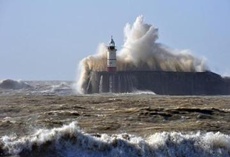All eyes on US as Bonn climate meet gets under way
06 Nov 2017
Confronted with a flood of grim reports on the gathering pace of global warming, climate negotiators meet in Bonn today for another climate conference.
 Up to 25,000 people are expected to attend the talks, which will be presided over by Prime Minister Frank Bainimarama of Fiji - the first time that the small island nation will be at the helm of a major international climate conference.
Up to 25,000 people are expected to attend the talks, which will be presided over by Prime Minister Frank Bainimarama of Fiji - the first time that the small island nation will be at the helm of a major international climate conference.
Participants in the 12-day conference will include diplomats from 195 nations, as well as scientists, lobbyists and environmentalists.
The talks come amid mounting evidence that global warming and pollution are causing economic and social havoc.
For example, a report published in the Lancet last week said that globally, extreme weather caused some $129 billion in economic losses in 2016. In India, one of the worst hit countries, more than half a million are estimated to have died prematurely in 2015 due to increasing particulate matter (PM) 2.5 air pollution. (See: Air pollution killed over 5 lakh Indian in 2015: Lancet study).
So far, earth's average temperature has gone up 1°C compared to pre-industrial levels - enough to wreak havoc in many parts of the world.
Voluntary national pledges to reduce carbon pollution would still see the world heat up by a blistering 3 C, leaving a critical "emissions gap" and very little time to fill it.
In Bonn, negotiators are wondering to what extent US President Donald Trump – with his avowed push for greater fossil fuel use - will make their jobs more difficult.
Five months after the world's most famous climate sceptic said he would yank the United States out of the 196-nation Paris Agreement, the diplomats and leaders tasked with implementing it remained both defiant and concerned.
"We must preserve the global consensus for decisive action enshrined in the Paris Agreement," Bainimarama said in a statement.
"The human suffering caused by intensifying hurricanes, wildfires, droughts, floods and threats to food security caused by climate change means there is no time to waste."
Leaders from a score of nations are expected to take part in the 12-day talks running through 17 November, including French President Emmanuel Macron and German Chancellor Angela Merkel. The US will be represented by Undersecretary of State for Political Affairs Thomas Shannon.
The 2015 Paris accord set a target of limiting global warming to 1.5°celsius by the end of the century. But diplomats didn't agree on the details of how their nations will reach that ambitious goal. The Bonn talks will flesh out the rule book that countries have to abide by.
This includes coming up with international standards for how to measure carbon emissions, to make sure that one nation's efforts can be compared to another's. A second debate centres on how countries take stock of what's been achieved and set new, more ambitious goals for curbing carbon emissions after 2020.
The Trump effect
The third big issue concerns money. Experts agree that shifting economies away from fossil fuels and preparing countries for some of the inevitable consequences of climate change will require vast financial resources - including some from the Trump administration.
That daunting task has been made all the more difficult by the US pullout, diplomats and experts said.
The problem extends beyond the likely shortfall in the reduction of US emissions, despite Trump's vow to protect carbon-intensive, coal-fired power plants from closure. State-level governments led by California, along with major US-based companies, will likely pick up much of the slack.
Nor is what some call the 'Trump Gap' in climate financing - including $2.5 billion promised by Barack Obama but disavowed by his successor – considered a deal breaker.
The concern is more whether other leaders who were already reluctant to foreswear fossil fuels as the main engine of economic growth for their countries will lose resolve.
"The Paris Agreement boosted climate action, but momentum is clearly faltering," said Costa Rica's environment minister Edgar Gutierrez-Espeleta.
"It will be very important to listen to ministers, to see how determined they are, and whether there will be any back-sliding," said Laurence Tubiana, president of the European Climate Foundation and - as France's climate ambassador in 2015 - one of the Paris Agreement's main architects.
The Bonn meeting, she noted, was supposed to be mostly technical, a chance to complete a complicated "rule book" for implementing the treaty's provisions.
These include ensuring transparency and compliance, reporting of emissions, procedures for dispersing climate funds, and half-a-dozen other key areas.
"But with the US decision, it has in fact become an important 'political moment'," Tubiana told AFP.
Washington has kept a low profile going into the Bonn talks.
"The United States will participate in the 23rd meeting of the Conference of the Parties," a State Department official told AFP by email.
At the same time, "the Administration's position on the Paris Agreement remains unchanged," the official added.
"The United States intends to withdraw ... as soon as it is eligible to do so, unless the President can identify terms that are more favourable to American businesses, workers, and taxpayers.''



















